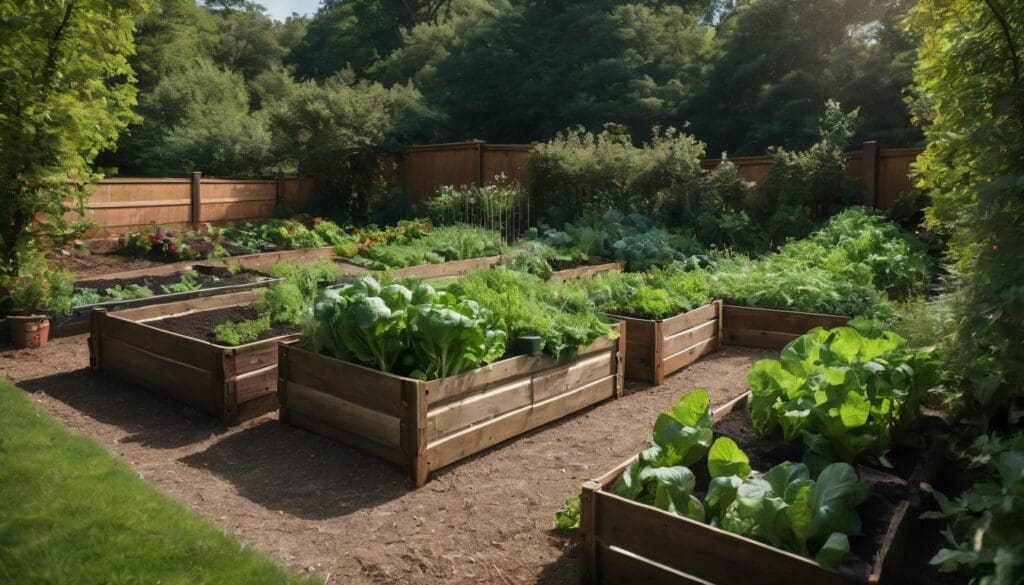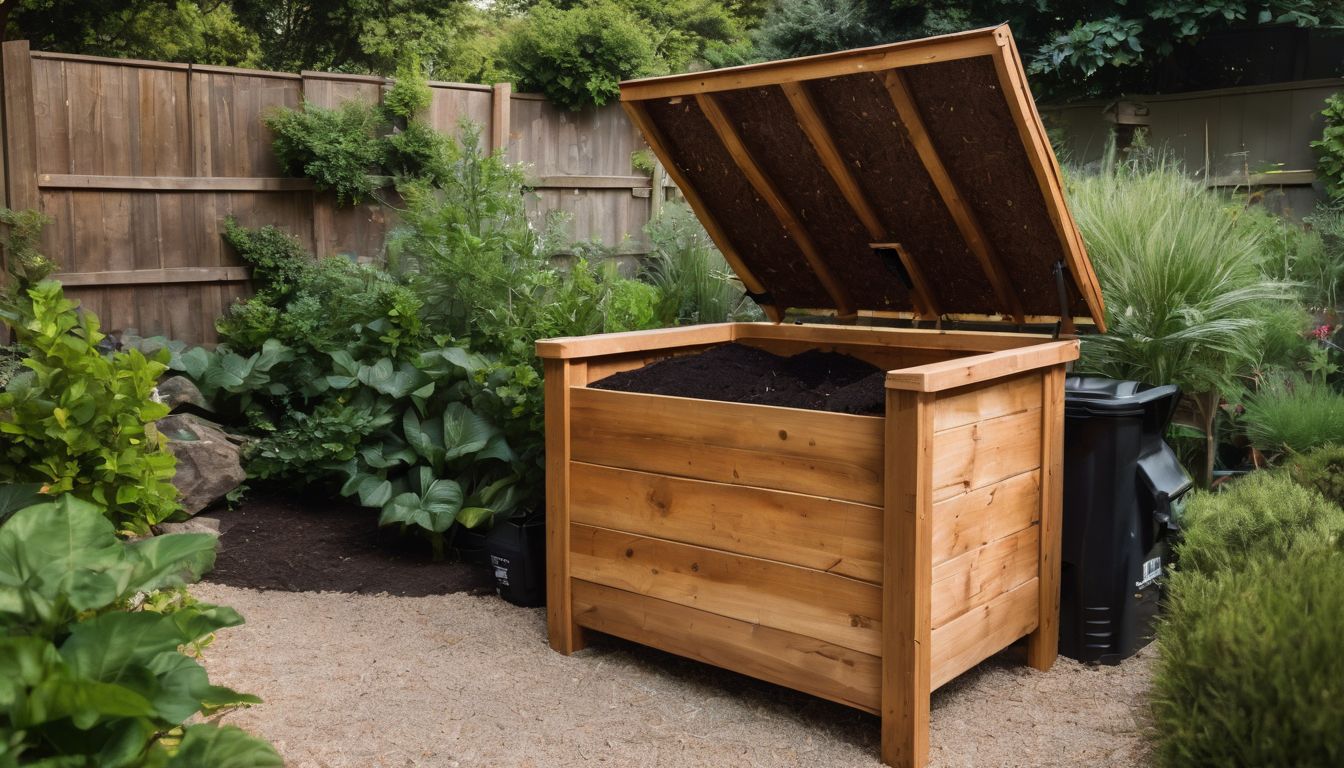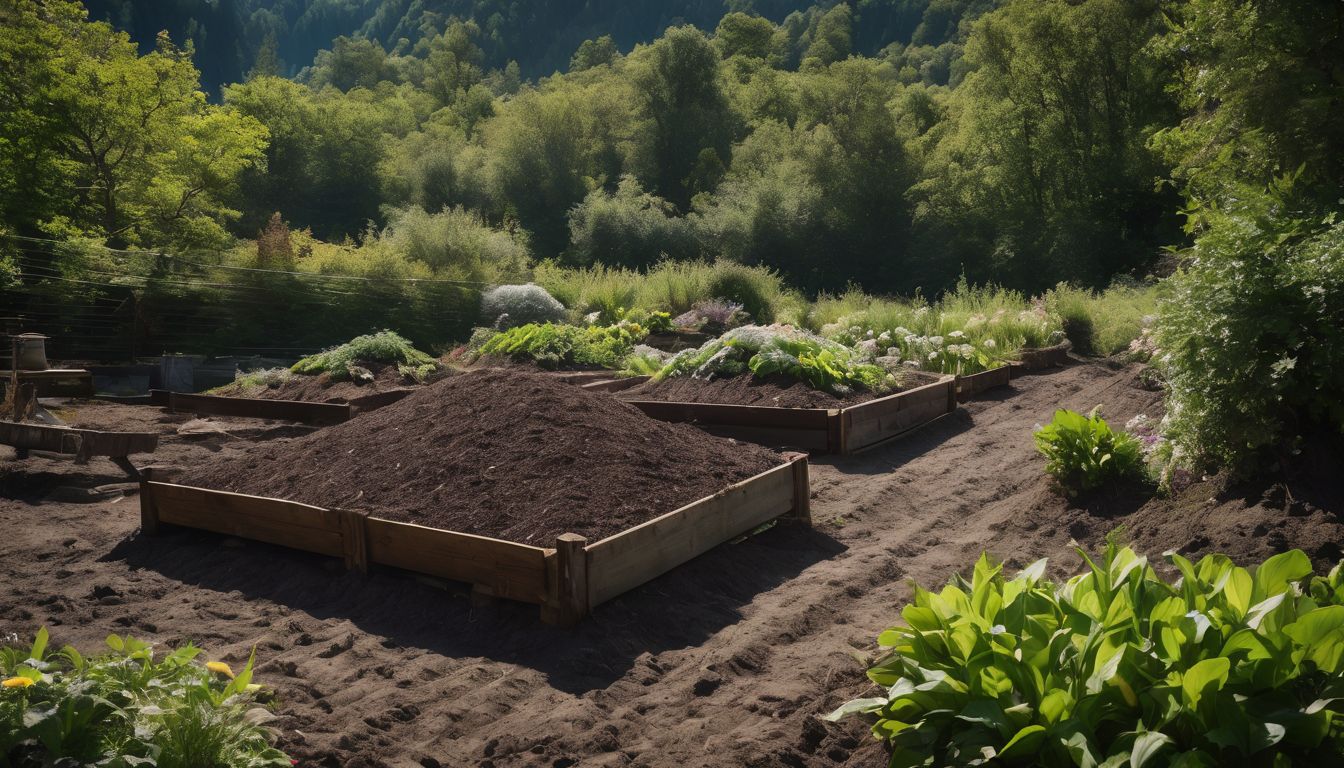Many of us are looking for ways to cut costs and live more sustainably. Composting at home turns everyday kitchen scraps into valuable garden gold, enriching soil without the need for chemical fertilisers.
This article will show you how transforming your organic waste into compost not only benefits the environment but also boosts your household economy. Discover the savings behind this green practice – keep reading!
Key Takeaways
- Composting at home can significantly cut down on disposal costs and reduce the need for chemical fertilisers by turning organic waste into valuable soil nutrients.
- Selling excess compost offers a potential income source, while farmers benefit from lower production costs due to reduced reliance on synthetic fertilisers.
- Community and home composting initiatives create job opportunities in sustainable waste management, agriculture, and the wider green economy.
- By enriching soil with composted material, households can save money on food by growing healthier produce and potentially reducing grocery bills.
- Implementing composting practices contributes to environmental conservation efforts, promoting cleaner water sources through natural filtration and helping control erosion.
The Environmental Benefits of Composting
Composting improves soil health and filtration, leading to cleaner water sources. It also reduces greenhouse gas emissions and helps control erosion, contributing to a healthier environment.
Soil health and filtration
Healthy soil acts as a natural filter, cleaning the water that moves through it. Composting enriches the soil with essential nutrients, improving its structure and ability to hold water.
This process reduces runoff and ensures harmful substances are less likely to contaminate our water sources. By adding organic matter from your household waste to compost, you’re not only enhancing soil fertility but also contributing to sustainable living.
Incorporating compost into gardens supports beneficial microbes that break down pollutants and improve filtration systems naturally. Sustainable agriculture thrives when farmers use finished compost because it increases resource efficiency and promotes green living.
Good soil health minimises the need for chemical fertilisers that can harm the environment, leading directly to cleaner watersheds and a reduction in your carbon footprint.
Cleaner water sources
Composting contributes to cleaner water sources by reducing the levels of harmful chemicals and pollutants that seep into the groundwater. When organic waste decomposes in landfills, it generates a toxic liquid called leachate, which can contaminate nearby water sources.
Composting prevents this pollution, as it keeps organic waste out of landfills and allows for natural filtration of rainwater through healthy soil. This process helps to protect both surface water bodies and underground aquifers from contamination, ensuring a safer and more sustainable water supply for communities.
By composting at home or supporting community composting initiatives, individuals can actively contribute to cleaner water sources while also benefiting from nutrient-rich soil for their gardens.
Reduction in greenhouse gas emissions
Composting reduces greenhouse gas emissions. Organic waste in landfills produces significant amounts of methane, a potent greenhouse gas. When organic matter is composted, it breaks down aerobically, minimising the release of methane into the atmosphere.
By diverting organic waste from landfills and turning it into nutrient-rich compost, we can help mitigate climate change and reduce our carbon footprint. This simple action contributes to a healthier environment and a more sustainable future for all.
Erosion control
Reducing greenhouse gas emissions helps in preserving soil structure and preventing erosion. Composting enriches the soil, making it less susceptible to erosion caused by wind or water.
This is beneficial for agricultural lands and gardens as it maintains the integrity of the soil, ensuring long-term sustainability and productivity.
Erosion control through composting supports a healthier environment by safeguarding against land degradation and promoting sustainable land use. It also contributes to cleaner water sources, reduces carbon emissions, and conserves valuable ecosystems – all critical components of environmental conservation and sustainable waste management efforts.
The Economic Benefits of Composting
Composting can lead to reduced disposal costs, an untapped source of income, lower production costs for farmers, savings on food costs at home, and job creation – read more to learn about the economic advantages of composting.
Reduced disposal costs
Home composting significantly reduces disposal costs, offering a practical solution for managing organic waste at minimal expense. By diverting food scraps and yard waste from landfills, households can decrease the amount of rubbish sent to incinerators or garbage dumps, leading to lower disposal fees and reduced strain on municipal resources.
Utilising home composting systems also cuts down on the need for special waste removal services, resulting in long-term cost savings while contributing positively to environmental conservation efforts.
Moreover, by reusing nutrient-rich compost in gardens or lawns, individuals can reduce expenditure on commercial fertilisers; thereby creating an additional avenue for financial gain through sustainable practices.
An untapped source of income
Composting at home presents an exciting opportunity to generate income through selling excess compost to local gardeners and farmers. By converting organic waste into nutrient-rich soil, individuals can tap into a potential stream of revenue by meeting the high demand for natural fertilisers in sustainable agriculture practices.
Recycling food scraps and garden waste not only reduces landfill costs but also provides an untapped source of income for environmentally conscious individuals committed to promoting sustainable waste management.
Lower production costs for farmers
Composting lowers production costs for farmers by providing a cost-effective alternative to chemical fertilisers. This results in reduced spending on synthetic inputs, saving farmers money and making their operations more economically sustainable.
Additionally, compost improves soil structure and fertility, leading to increased crop yields and healthier plants, which further contributes to lowering production costs.
Moreover, using finished compost allows farmers to minimise expenses associated with purchasing commercial soil amendments. By integrating natural soil enrichment techniques through composting into their agricultural practices, farmers can enhance productivity while reducing expenditure on external nutrient supplements.
Savings on food costs at home
Lower production costs for farmers contribute to the potential reduction in food prices for consumers. Increased availability and affordability of fresh produce can lead to healthier meal choices and lower household food expenses, benefiting families’ budgets.
By diverting organic waste from landfills into compost, individuals can produce nutrient-rich soil additives for their gardens, reducing the need for store-bought fertilisers and fostering sustainable gardening practices.
Moreover, utilising finished compost in home gardens or community plots not only reduces reliance on commercial soil amendments but also encourages self-sufficiency in organic produce cultivation.
Job creation
Composting creates jobs in various sectors, from waste management to agriculture. As more people participate in home composting and community initiatives, the demand for skilled compost managers and educators grows.
Additionally, local businesses that process organic waste into compost contribute to job creation within the green economy.
Moreover, the use of finished compost enriches soil health, leading to increased productivity in agricultural settings. This results in a higher demand for farm labor and supports rural employment opportunities.
Social Benefits of Composting
Reducing landfill waste, promoting healthier food choices, strengthening food systems, and embracing a regenerative outlook for the environment. Learn more about the economic benefits of home composting by reading our full blog post.
Reducing landfill waste
Home composting plays a crucial role in reducing landfill waste, benefiting both the environment and the economy. When organic waste is composted at home instead of being disposed of in landfills, it significantly reduces the amount of waste that ends up taking up space in these facilities.
Furthermore, by diverting organic matter from landfills, we can prevent the release of harmful greenhouse gases that contribute to climate change and create more sustainable waste management systems.
Composting food scraps and garden waste at home helps to decrease reliance on traditional waste disposal methods and promotes household sustainability. As a result, this practice positively impacts local communities by lowering environmental impact while also providing valuable nutrients for soil health through natural recycling processes.
Promoting healthier food
By reducing landfill waste through composting, we contribute to promoting healthier food. The nutrients from composted organic waste enrich the soil, leading to more nutritious fruits and vegetables.
This nutrient-rich soil also reduces the need for chemical fertilisers and pesticides, resulting in cleaner, safer food for our families. Agricultural practices that incorporate composting tend to yield produce with higher levels of essential vitamins and minerals, thus contributing to a healthier diet overall.
Strengthening food systems
Promoting healthier food through composting also contributes to strengthening food systems. By enriching the soil with nutrient-rich compost, the quality and quantity of crops increase, leading to improved access to fresh and nutritious produce.
This sustainable approach reduces dependency on expensive chemical fertilisers while promoting biodiversity and resilience in agricultural ecosystems. Additionally, integrating composting practices into local farming communities fosters self-sufficiency, reduced waste, and enhanced nutrition for all.
The integration of composting in food systems not only supports environmental conservation but also enhances food security by creating a more resilient and diversified agricultural landscape.
A regenerative outlook
Composting offers a regenerative outlook for the environment and local communities. By diverting organic waste from landfills, composting directly contributes to reducing landfill waste and promoting healthier food systems.
This approach supports natural soil enrichment, strengthens food production, and ensures sustainable waste management practices are in place. Composting not only benefits the environment but also provides economic advantages by creating job opportunities and lowering production costs for farmers.
Moreover, community composting initiatives encourage collaboration and knowledge sharing among individuals who are passionate about conservation. The regenerative outlook of composting fosters a sense of responsibility towards the environment and promotes active participation in sustainable practices that benefit current and future generations.
Implementation of Composting
Composting at home is a simple and effective way to reduce food waste, while community composting initiatives provide opportunities for sharing resources and knowledge. Both methods support sustainable waste management practices and promote natural soil enrichment.
Composting at home
Composting at home allows you to recycle organic waste for free, enriching your soil and reducing landfill waste. Here’s how to get started:
- Choose a location for your compost bin that is easy to access and receives sunlight.
- Start with a mix of “greens” (fruit and vegetable scraps, coffee grounds) and “browns” (dried leaves, paper).
- Turn the compost regularly to aerate it and speed up decomposition.
- Keep a balance of moisture by adding water or dry materials as needed.
- Avoid adding meat, dairy, or oily foods to your compost pile.
- Use the finished compost to enrich your garden soil.
Community composting
Community composting is a collaborative effort to manage organic waste within a neighbourhood or local area. It involves setting up shared composting facilities where residents can contribute their food scraps and garden waste.
- Encourages community engagement: Community composting brings people together to work towards a common goal of reducing waste and promoting sustainable practices in the local area.
- Reduces transport emissions: By composting locally, it minimises the need for transporting organic waste to distant facilities, lowering carbon emissions.
- Provides valuable resources for local gardens: The resulting compost can be distributed among the community members, enriching the soil for urban gardens and green spaces.
- Fosters education and awareness: It offers opportunities for educational workshops and initiatives about waste reduction, recycling, and environmental stewardship within the community.
Sharing resources and knowledge
- Engage with your local community by organising composting workshops and information sessions to share best practices and tips for successful home composting.
- Collaborate with local gardening clubs and environmental organisations to exchange knowledge and resources on composting techniques, troubleshooting common issues, and innovative ways to utilise finished compost.
- Connect with schools and educational institutions to promote the benefits of composting, providing educational materials for students, teachers, and parents to cultivate a culture of sustainability.
- Participate in online forums and social media groups dedicated to composting where you can share your experiences, ask questions, and learn from others who are passionate about reducing organic waste.
Conclusion
In conclusion, home composting offers numerous economic advantages. It helps reduce disposal costs and can serve as an untapped source of income for individuals. Additionally, it lowers production costs for farmers and creates jobs within the community.
Overall, embracing home composting not only benefits the environment but also has positive economic implications for both households and local economies.
FAQs
1. What are the economic benefits of home composting?
The economic benefits of home composting include saving money on waste disposal fees, reducing landfill waste, and naturally enriching soil which can lessen the need for costly fertilisers in agriculture.
2. How does composting at home help with organic waste recycling?
Composting food waste at home turns it into valuable compost that can be used to improve garden soil, benefiting both your pocket and the environment by cutting down on organic waste that would otherwise end up in landfills.
3. Can finished compost from my garden really impact agriculture economically?
Yes indeed! Using finished compost in your garden improves the health of your plants without purchasing commercial products. This practice contributes to sustainable agriculture by providing a cost-effective alternative to chemical fertilisers.
4. Why is it advantageous to have sustainable waste management through home composting?
Sustainable waste management through advantages like those offered by regular home composting not only helps reduce your household expenses related to rubbish disposal but also greatly decreases our reliance on unsustainable landfill practices.





